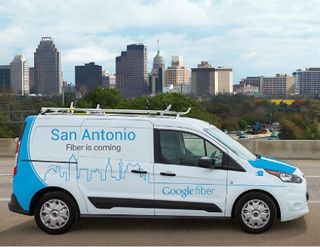Study: Market ‘Too Dismissive’ of Google Fiber

While it remains questionable as to whether Google Fiber can scale up its network deployments and put the hurt on incumbents over the long term, a new study from Bernstein Research suggests that Wall Street “is too dismissive” of the initiative's true potential.
“We have increased conviction that Google’s main motivation to deploy Google Fiber is its belief that it has a better-than-good chance to build a profitable local-access competitor,” Carlos Kirjner, a senior analyst with the firm, noted in a study, which included fresh data from recent door-to-door surveys in some Google Fiber markets.
He also reiterated his view that Google Fiber’s primary aim is not to influence policy makers or to force cable operators and telcos to accelerate upgrades, but does acknowledge that incumbents such as AT&T, Comcast, CenturyLink and Cox Communications have moved ahead with targeted fiber-based gigabit offerings.
Kirjner is also aware that Google’s deployment so far “has been slow and limited,” estimating that Google Fiber currently passes about 427,000 homes, and 96,000 business locations, primarily in Kansas City and Provo, Utah.
Even if Google were to build out in all cities it has committed to or considering, it would still only pass 4.3 million homes – “still a small portion of the total market," he wrote.
The report also estimates that Google fiber has between 100,000 to 120,000 paid subs, “a very small number that likely plays into the incumbents' default belief that deploying and operating wireline networks at scale is much harder than commonly thought.”
But incumbents, Kirjner warned, should not get “too complacent” in the face of those figures, holding that Google Fiber could nab between 40% to 50% market share in its areas, which could have a deeper impact if Google does decide to expand aggressively.
Multichannel Newsletter
The smarter way to stay on top of the multichannel video marketplace. Sign up below.
Google Fiberrecently committed to launch service in San Antonio, Texas, building on deployments in Kansas City; Provo, Utah; and Austin, Texas, and deployments that are underway in Salt Lake City; Nashville, Tenn.; Atlanta; Charlotte; and Raleigh-Durham. It’s also exploring expansions in three more cities – Irvine and San Diego, Calif., and Louisville, Ky.
Kirjner also speculated a scenario in which Google Fiber could deploy to 15 million to 20 million homes within six to eight years, which would represent a “non-trivial commitment” that is “far from impossible” considering Google’s means.
Bernstein’s data also shows that Google Fiber has performed well in the markets where it has a presence.
Based on a past door-to-door survey in Google “Fiberhoods” in Kansas City, Bernstein estimates Google Fiber has achieved a penetration rate of about 20% of homes passed within one year of turning on service, “putting it well on the way to exceed 40% of homes passed and realize attractive ROIs.”
Bernstein repeated that test in Provo, via a survey of 850 households in all seven Fiberhoods in Provo, and found similar results (penetrations of 20% to 25% for paid Google Fiber services – a larger portion of homes take Google Fiber’s free high-speed Internet service that delivers 5 Mbps down and 1 Mbps upstream). The survey also found that 44% of Google Fiber subs in Provo were previously with Comcast, and 8% did not previously take a broadband service. Google Fiber entered that market in 2013 via its acquisition of iProvo's assets.
Those results, the analyst said, “reinforce our view that Google Fiber could generate attractive ROIs, that incumbents stand to lose significant market share where Fiber is deployed, and that Google’s continued expansion of Fiber…is a non-trivial possibility.”
Of the telcos, Kirjner sees AT&T and CenturyLink to be “particularly vulnerable to Google targeting” given their sizable wireline footprints and the difficulty they’ll have executing scaled gigabit rollouts.
Cable, he said, is better positioned to defend with the DOCSIS 3.1, which will bring multi-gigabit speeds to its widely deployed HFC networks. Rollouts of D3.1 are expected to start in 2016, and ramp up considerably in 2017. But MSOs will be challenged to meet Google Fiber’s “disruptively low price” ($70 per month for the standalone 1-Gig offering).
Under the firm’s the "aggressive expansion" scenario for Google Fiber, Bernstein estimates that Comcast and New Charter (which includes the proposed acquisitions of Time Warner Cable and Bright House, could tangle with Google Fiber in 15% of their addressable market and be in position to lose about 10% of their current customer broadband subs -- “[a] material, although not ruinous, negative impact,” Kirjner wrote.
And incumbents are also dealing with a competitor that gets high satisfaction ratings. According to Bernstein, the median score for Google Fiber satisfaction was nine (on a 1-10 scale), and only 3% reported less than a five.
